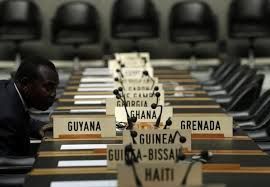 | « Back to article | Print this article |
 It is always a clinical surgery at World Trade Organization where a patient can die if you miss the target, says its Chief Roberto Azevedo, which probably explains why the 20-year-old global body could seal its first major trade pact in 2014 after a never-seen-before deal between India and the US.
It is always a clinical surgery at World Trade Organization where a patient can die if you miss the target, says its Chief Roberto Azevedo, which probably explains why the 20-year-old global body could seal its first major trade pact in 2014 after a never-seen-before deal between India and the US.
The differences between the rich and developing nations have always been at the core of the World Trade Organisation, set up in 1995 to facilitate greater trade flows across the world, and it came as a major breakthrough when the US and India reached a deal over food security issues in 2014.
It was this deal that eventually facilitated the first ever major trade pact at the WTO and India is now looking forward to push for the long-pending Doha agenda at the global trade body in 2015.
Launched in 2011, the Doha Round of negotiations have remained virtually stalled since July 2008 when the trade ministers' meeting in Geneva collapsed due to differences between the rich and the developing nations.
The deadlock mainly emerged on the issue of protection for farmers in developing countries and duty cut on industrial goods.
The year 2014 also saw a never-seen-before bonhomie between India and the US, who have been staunch opponents at this global forum for years but managed to seal a deal between them to facilitate the long-stalled Trade Facilitation.
Agreement at the WTO that seeks to reduce transactions cost and ease global customs norm for global trade.
Officials said the breakthrough came after the issue was discussed between Prime Minister Narendra Modi and US President Barack Obama.
WTO Director-General Roberto Azevedo said the agreement between India and the US was key to get the multilateral trading system back on track and gave him a basis to intensify his consultations with other WTO members.
For 2015, he has said it is going to be a big year for the WTO with the celebration of its 20th anniversary and the holding of its 10th Ministerial Conference.
Azevedo also said that ‘we have real deadlines to meet’, including developing the work programme on the remaining Doha Round issues by the end of July 2015.
Looking ahead, India also wants to bring back the long-stalled Doha round on the table.
"Doha agenda will be back on tables (in 2015) and we will push for that," Commerce Secretary Rajeev Kher told PTI.
Biswajit Dhar, Professor, Centre for Economic Studies and Planning, Jawaharlal Nehru University also said that there are a number of pending issues under the Doha Round of talks which India would like to bring on the table next year.
"There are some substantive issues related with agriculture, services and intellectual property rights.
India should also have to look at the Post-Bali work programme.
“We have to see how effectively we can raise these issues," Dhar said.
The objective of the Doha agenda is to reduce trade barriers across the globe and facilitate trade.
The main pending issues include agriculture (export subsidies, cotton and fishery subsidies), IPR, market access and services.
While India wants developed countries to drastically reduce agri subsidies and relax visa norms for its professionals, the rich nations are asking for significant reduction in industrial good tariffs and further strengthening of patent laws.
India also wants to resolve issues of the Least Developed Countries.
As per estimates, the US provided about USD 4 billion of support to their agricultural producers under the category of Current Total Aggregate Measurement of Support (i.e. support considered under WTO classification as trade-distorting) and $120 billion as Green Box support (non-trade-distorting).
Similarly, the European Union provided 9 billion euro as Current Total Aggregate Measurement of Support and about 64 billion euro as Green Box support.
There is also a proposal to eliminate tariffs on a list of environmental goods, which has not been supported by India and some other developing countries.
As part of the sectoral negotiations, the US wants developing countries, including India, to reduce their tariffs on chemicals, industrial engineering goods, and electricals and electronics, bringing them close to zero.
2014 will still remain an important year for the WTO as member nations agreed for a global trade reform deal.
The pact was dear to developed nations such as the US and Europe as they are struggling to bring back their sagging economy on the growth trajectory.
As per the pact, no country will challenge food stockpiling issue programme of developing nations, including India, at the WTO till a permanent solution is found on the matter.
Further, implementation of the TFA would also come up in 2015.
"The Union cabinet would ratify the agreement first and then the pact would be implemented," an official said.
But the real work may remain challenging for WTO in the new year as well and justify its description by Azevedo who once famously said, "At the WTO, it's never a general surgery.
"It's always a very specific, clinical, precise surgery -- and you can't miss the target.
"If you miss the target, you kill the patient. It's as simple as that."